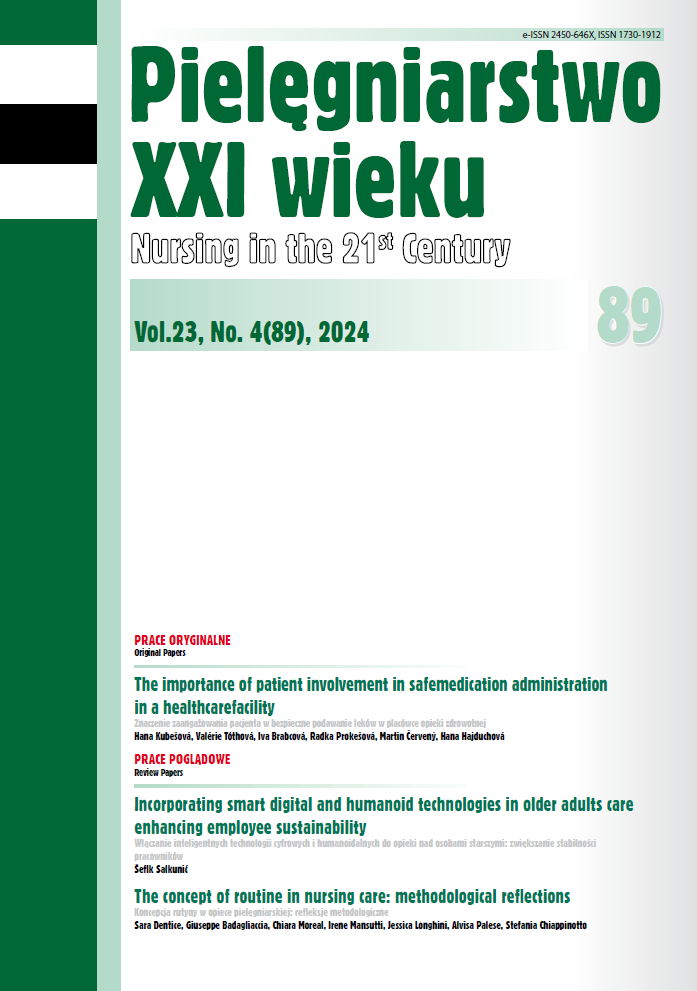Nurses’ motivation, attitudes and knowledge in wound care: a cross-sectional study
DOI:
https://doi.org/10.12923/pielxxiw-2024-0051Keywords:
knowledge, attitude, clinical competence, wound care, motivationAbstract
NURSES’ MOTIVATION, ATTITUDES AND KNOWLEDGE IN WOUND CARE: A CROSS-SECTIONAL STUDY
Aim. Chronic/hard-to-heal/non-healing wounds are a worldwide problem that requires educated, motivated nurses with a positive attitude towards wound management. The aim was to assess the motivation, attitudes and knowledge of nurses treating patients with chronic wounds during their daily practice prior to completing the newly introduced certification program.
Material and methods. An exploratory cross-sectional study. Ninety-four randomly selected nurses who work with patients with wounds on a daily basis participated in this study. The instrument constructed by authors was distributed from February to March 2022.
Results. The overall motivation reached 73%, attitude 53% and knowledge 54%. There was a significant difference found in motivation between departments/settings (P = 0.036) with the highest level achieved by home care nurses, a positive correlation between knowledge and level of education (P = 0.042), and positive attitudes in the group of nurses with specialization (P = 0.021). Nurses are interested in further education, but they lack competences.
Conclusions. The results are linked to the previous absence of structured nursing education in wound management. Effective management of patients with chronic wounds is complex and requires appropriate knowledge, attitudes and motivation towards wound care. It is expected that nurses’ will and new certification will lead to positive overall outcomes.
References
1. Olsson M, Järbrink K, Divakar U, et al. The humanistic and economic burden of chronic wounds: A systematic review. Wound Repair Regen. 2019;27(1):114-125. doi:10.1111/wrr.12683.
2. Nussbaum SR, Carter MJ, Fife CE, et al. An Economic Evaluation of the Impact, Cost, and Medicare Policy Implications of Chronic Nonhealing Wounds. Value Health. 2018;21(1):27-32. doi:10.1016/j.jval.2017.07.007.
3. Martinengo L, Olsson M, Bajpai R, et al. Prevalence of chronic wounds in the general population: systematic review and meta-analysis of observational studies. Ann. Epidemiol. 2019;29:8-15. doi:10.1016/j.annepidem.2018.10.005.
4. Guest JF, Fuller GW, Vowden P. Cohort study evaluating the burden of wounds to the UK’s National Health Service in 2017/2018: update from 2012/2013. BMJ Open. 2020;10(12):e045253. doi:10.1136/bmjopen-2020-045253.
5. Werdin F, Tenenhaus M, Rennekampff HO. Chronic wound care. Lancet. 2008;372(9653):1860-1862. doi:10.1016/S0140-6736(08)61793-6.
6. Welsh L. Wound care evidence, knowledge and education amongst nurses: a semi-systematic literature review. Int. Wound J. 2018;15(1):53-61. doi:10.1111/iwj.12822.
7. Dimunová L, Rónayová I, Grešš Halász B, et al. Analysis of chronic wound management in nursing. Clinical Social Work and Health Intervention. 2020;11(3):65-70. doi:10.22359/cswhi_11_3_10.
8. Act of the National Council of the Slovak Republic No. 578/2004 Coll. on health care providers, health care workers, professional organisations in health care and on amendment and supplementation of certain acts.
9. Act of the National Council of the Slovak Republic No. 311/2002 Coll. on the profession of nurse, on the profession of midwife, on the Slovak Chamber of Nurses and Midwives and on the amendment and supplementation of the Slovak National Council Act No. 14/1992 Coll. on the Slovak Chamber of Secondary Health Care Professionals and on the Slovak Chamber of Dental Technicians.
10. Decree of the Ministry of Health of the Slovak Republic No. 208/2024 Coll.
11. Measure of the Ministry of Health of the Slovak Republic of December 12, 2019 no. 09796-2019-OL laying down minimum standards for specialisation study programmes, minimum standards for certification study programmes and minimum standards for further education study programmes and their structure, as amended.
12. Wang X, Cheng Z. Cross-Sectional Studies: Strengths, Weaknesses, and Recommendations. Chest. 2020;158(1S):S65-S71. doi: 10.1016/j.chest.2020.03.012. PMID: 32658654.
13. Saibertová S, Kůřil P, Menšíková A, et al. Nurses‘ knowledge in the field of specific prevention and treatment of heels pressure injuries. Ceska a Slovenska Neurologie a Neurochirurgie. 2022;85(Supp. 1):38-42. doi:10.48095/cccsnn2022S38.
14. Ferreira AM, Rigotti MA, da Silva Barcelos L, et al. Knowledge and practice of nurses about care for patients with wounds. Revista de Pesquisa Cuidado é Fundamental Online. 2014;10(12):4532-4538. doi:10.9789/2175-5361.2014.v6i3.1178-1190.
15. Corbett LQ. Wound Care Nursing: Professional Issues and Opportunities. Adv Wound Care. (New Rochelle). 2012;1(5):189-193. doi:10.1089/wound.2011.0329.
16. Goudy-Egger L, Dunn KS. Use of Continuing Education to Increase Nurses’ Knowledge of Chronic Wound Care Management. J. Contin. Educ. Nurs. 2018;49(10):454-459. doi:10.3928/00220124-20180918-05.
17. Hoffmann B. Motivation for Learning and Performance. 1st ed. Elsevier Academic Press, 2016.
18. Oldland E, Redley B, Botti M, et al. Nurses’ motivations and desired learning outcomes of postgraduate critical care studies: A descriptive exploratory study. Aust. Crit. Care. 2023;36(4):586-594. doi:10.1016/j.aucc.2022.05.004.
19. Kinsella D, Fry M, Zecchin A. Motivational factors influencing nurses to undertake postgraduate hospital-based education. Nurse Educ. Pract. 2018;31:54-60. doi:10.1016/j.nepr.2018.04.011.
20. Pokorná A, Holloway S, Strohal S. Wound curriculum for nurses: post-registration qualification wound management - European Qualification Framework level 5. Journal of Wound Care. 2017;26(Supp.12): S1-S27. doi: 10.12968/jowc.2017.26.Sup12.S1.




